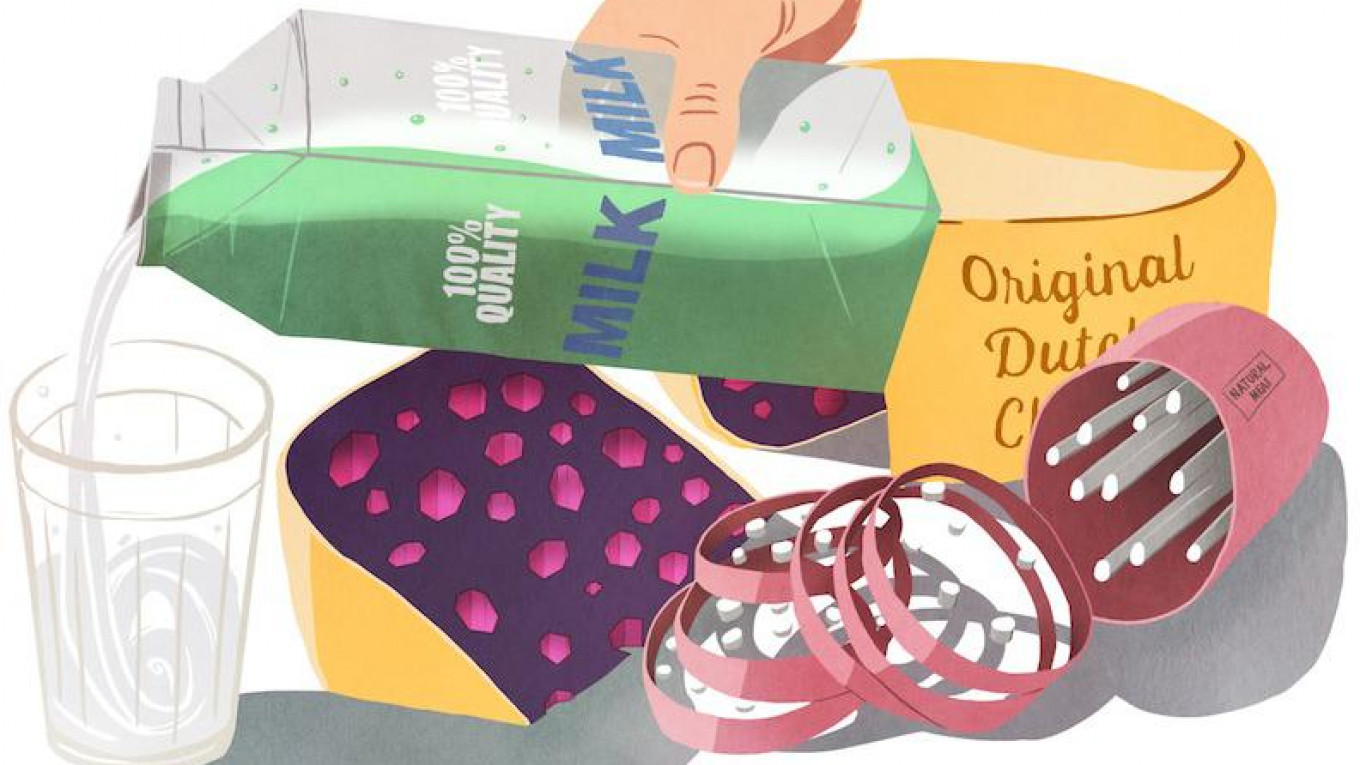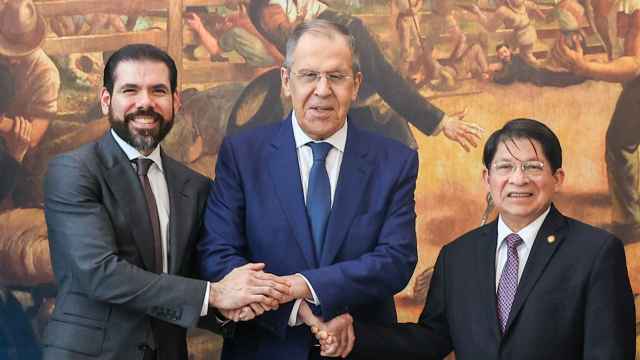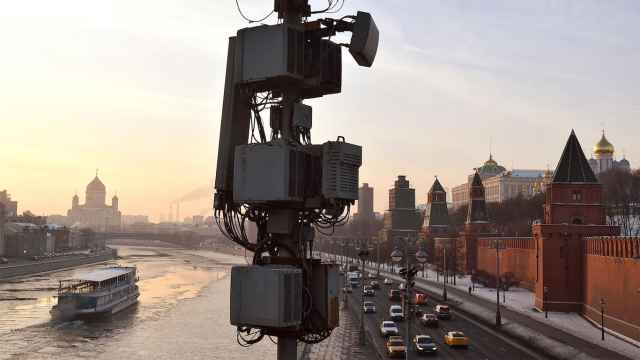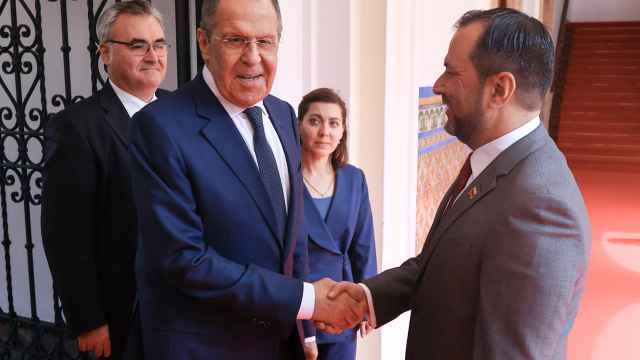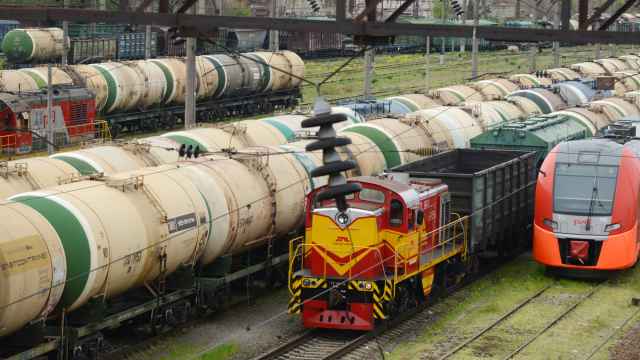If you live in Russia, you may already be worried about what you’re eating. If you’re not worried, maybe you should be.
Watchdogs say dairy producers routinely added starch, chalk and soap to their milk. One-fifth of caviar brands contained bacteria linked to E. coli. Bread bakers were discovered to use “fifth-grade” wheat, the sort usually intended for cattle. More than half the sliced salmon on shop shelves has been judged unsafe.
And those are only the most recent revelations.
Quality control in Russia’s food sector appears to have broken down. Products are plentiful. But behind the glossy labels, their true contents are a lottery.
How did things get so bad?
Power to Business
In Russia’s chaotic history since the downfall of the Soviet Union, there was likely never a golden age of food quality. But things undoubtedly took a turn for the worse in 2010, says Irina Tikhmyanova, a spokesperson for Roscontrol, a non-profit organization that monitors food standards.
Back then, Dmitry Medvedev was president, and his slogan was that “state bodies must stop tormenting business.” One of the bureaucracies to be thrown out was mandatory certification of food.
The old system was not perfect. Many officials were happy to sell certification for a few hundred dollars. But it did ensure that any new product underwent some scrutiny. And its demise tipped the balance of power in the food industry toward business.
Food producers were now required only to declare that their food met quality standards. They, together with retailers, were responsible for quality. The state limited itself to checking each manufacturer once every three years — and undertook to give prior warning before arriving, unless an official complaint was received.
“It was a victory for businesses that lobbied for less state control,” says Alexei Alexeyenko, assistant to the head of Russia’s Federal Service for Veterinary and Phytosanitary Surveillance, Rosselkhoznadzor.
The changes dramatically weakened consumer protection. “To all intents and purposes the layer of control between producers and the shop shelf — the basis of any defense against poor quality food — has been destroyed,” says Tikhmyanova. The end of certification left Russians “increasingly reliant on the goodwill of producers and suppliers.”
Then, two years ago, something transformative happened. In 2014, Moscow annexed Crimea and fomented civil war in eastern Ukraine. Most of the developed world imposed sanctions on Russia in response. Then, a few months later, the price of oil, Russia’s most important export, began to fall rapidly.
There were two knock-on effects. First, Moscow imposed retaliatory bans on most food imports from Europe, the U.S. and others who had joined the sanctions. Second, Russia entered its deepest, longest recession since the 1990s, and which is still to run its full course.
These developments poisoned the food market. Imports worth some $9 billion dollars a year were halted, freeing Russian producers from high-quality competition. Meanwhile, as Russians became poorer, they began to spend less on food.
That created ruthless pressure on producers to drive down prices. And thanks to the newly weakened state oversight, many chose dishonest methods. “Local food production began to grow very fast,” says Alexeyenko. “But with it came a negative — thanks to a lack of competition, producers began to falsify their products.”
This Product Is Not Cheese
When a group of concerned Russians set up Roscontrol three years ago to monitor the quality of consumer goods, they expected around 15-20 percent of products they tested to be faulty. It turned out to be a massive underestimation. “Sixty percent of the products tested by Roscontrol are poor quality, unsafe or falsified,” says Tikhmyanova.
Roscontrol buys products in shops, subjects them to laboratory testing, and publishes its findings online for the public to read. In April last year, it was joined by a new state-funded body called Roskachestvo, which does the same.
Their findings are often stunning. Thirty-six of 46 brands of cheese and butter tested last year by Roscontrol were falsified — that is, they violated sanitary norms, overused additives and preservatives, or were dishonest about their ingredients. “This product cannot be called cheese,” was the verdict on multiple products. One brand of butter, whose wrapper shows cartoon cows grazing in a neon green field and boasts a 72.5 percent fat content, was found to “contain no animal fat, only vegetable oils.”
A mere seven of 33 brands of sausage tested by Roscontrol in March met quality standards. The others contained potato flour, soy, unidentified additives and skin. In another test, two out of ten mineral water brands used recycled water; another two exceeded permitted levels of radioactivity. Among the offenders were major, nationwide brands and foreign companies.
These are not problems that are going to kill you. At least, probably not. Often, the fraud involved is a minor misstatement of a product’s contents. But worse does happen.
Roskachestvo unearthed its most shocking discovery while scrutinizing red caviar. Thirteen of the 23 brands tested failed to meet sanitary requirements. Five contained E. coli, a bacteria that lives in the gut and can be deadly.
The tests revealed multiple problems along the entire caviar supply chain, says Ilya Loevsky, Roskachestvo’s deputy director. Neither Roscontrol nor Roskachestvo can impose penalties themselves, so the information was passed to the companies involved and state authorities. Some stores removed the offending products, and some producers took immediate action, says Loevsky. But “some unscrupulous producers simply ignore the results,” he added.
Authorities have all the findings and have taken them into account, Loevsky said. He promised “there will be consequences.” But many of these brands, and other brands exposed in different investigations, remain on sale. It is unclear whether their quality or ingredients have changed.
Deep Dishonesty
The truth is that powerful market logic is pushing producers to exchange more expensive ingredients for cheaper ones. At the safe end, this means passing off cheap white fish as cod. At the unsafe end, factories are padding out cheese with technical-grade palm oil unfit for human consumption.
The food manufacturing sector is rife with substandard producers and “blatant crooks,” says Nikolai Vlasov, the deputy head of Rosselkhoznadzor. The deceit penetrates all levels, he told the TASS news agency in June. Company bosses are often unaware that rules are being broken by underlings or suppliers hoping for quick profit. “It’s corruption at lower levels — for example, someone carts out the cream and switches it with vegetable oil — or it’s a “gift” from business partners,” he said.
Fraud creates a vicious cycle that pushes down prices and makes it harder for honest producers to stay in business. With Russians’ incomes still falling, the situation is becoming worse. “In the longer term,” says Tikhmyanova, “this sort of price competition could cause quality products to die out.”
“The main problem,” according to Andrei Danilenko, head of the Russian Union of Milk Producers, “is that fines are so miserable that there is no incentive to change.” It takes Rospotrebnadzor, the state consumer rights watchdog responsible for doling out punishments, months to prove allegations against companies, Danilenko says. The maximum fine for a typical violation is 500,000 rubles ($8,000) — mere “kopeks” to business. Sometimes Rospotrebnadzor can’t even find the offender — manufacturers have been known to put fake company names on product labels.
But tougher rules could be on the way. “People are beginning to take this seriously,” says Rosselkhoznadzor’s Alexeyenko. They are starting to realize that a degraded food industry “imperils our health and is an extremely serious risk for the economy,” he says. If low standards become ingrained, Russian goods would be unable to compete with foreign rivals.
The agriculture minister has called for fines to be multiplied until companies “can feel them,” and suggested introducing criminal responsibility for fraud. There is talk of cigarette pack-style health warnings on products that contain palm oil. Last month, the government adopted a strategic plan to boost food standards through 2030.
But these efforts may clash with other, more urgent priorities. Putin sees food production as an urgent national security issue. He wants Russia to produce enough to feed itself by the end of the decade. Large agricultural holdings have meanwhile been making bumper profits in recent years. Many of these are owned by well connected tycoons. At least some of them, according to Vlasov, have been involved in fraud.
Finally, Putin is wary of upsetting his electorate. He said last year regulation must not increase production costs or the price of food in shops. Better to have skin in a few sausages than risk a full-blown food price riot.
Working Fast
So what’s the solution?
Fraud will continue as long as Russians are stuck in economic slump and clamoring for cheaper products, says Dmitry Vostrikov, head of development at Russia’s food producers lobby, Rosprodsoyuz. “The situation will improve if people’s incomes begin to rise,” he says.
Loevsky disagrees. Roskachestvo’s investigations show that price has no direct correlation with quality. Discount brands frequently outclassed premium-brand rivals.
Loevsky says the answer is better information for consumers. Roscontrol and Roskachestvo are exposing the worst offenders. Roskachestvo is also working with consumer watchdogs in Europe and the U.S., and pioneering a new certificate of quality that companies can display on their branding.
The numbers remain small. Roskachestvo receives only a few dozen complaints and tip-offs from consumers each week, and around 3,000 people visit its website each day.
“We are trying to work very fast,” says Loevsky. But, he adds, “solving the problem will take years.” In the meantime, then, be careful what you buy.
A Message from The Moscow Times:
Dear readers,
We are facing unprecedented challenges. Russia's Prosecutor General's Office has designated The Moscow Times as an "undesirable" organization, criminalizing our work and putting our staff at risk of prosecution. This follows our earlier unjust labeling as a "foreign agent."
These actions are direct attempts to silence independent journalism in Russia. The authorities claim our work "discredits the decisions of the Russian leadership." We see things differently: we strive to provide accurate, unbiased reporting on Russia.
We, the journalists of The Moscow Times, refuse to be silenced. But to continue our work, we need your help.
Your support, no matter how small, makes a world of difference. If you can, please support us monthly starting from just $2. It's quick to set up, and every contribution makes a significant impact.
By supporting The Moscow Times, you're defending open, independent journalism in the face of repression. Thank you for standing with us.
Remind me later.


